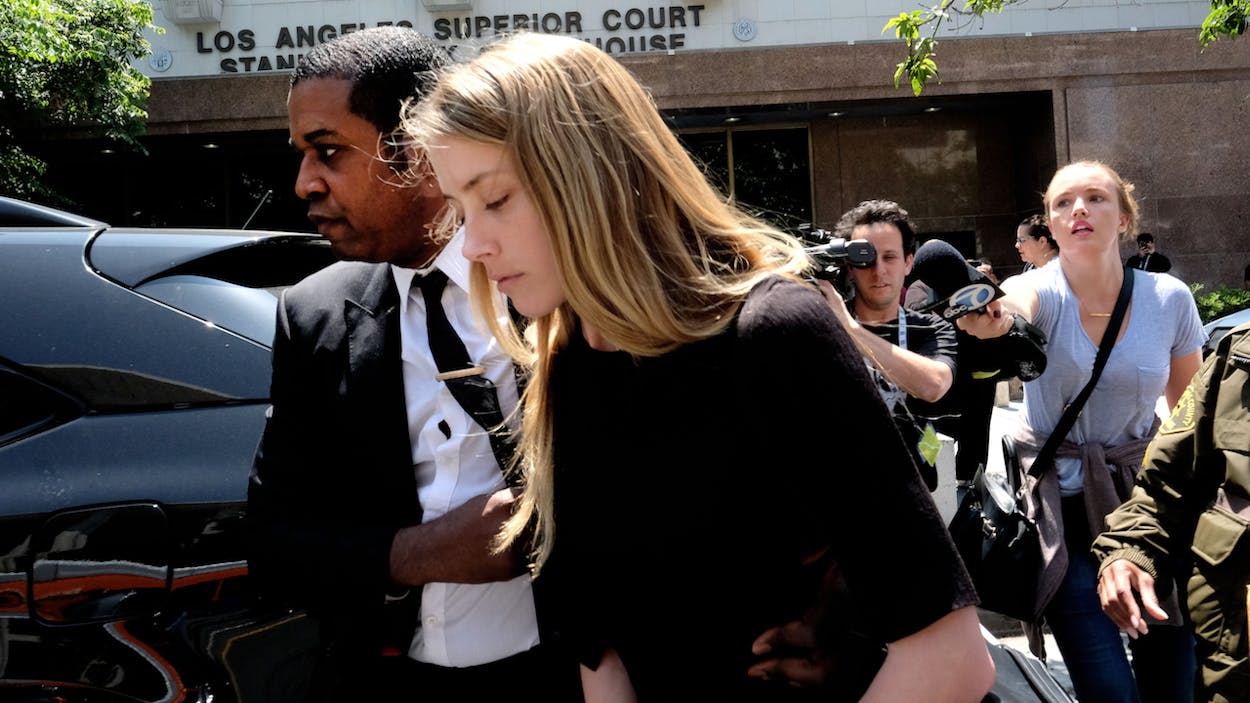We don’t know for sure what happened between Johnny Depp and Amber Heard, the actor and Austin native who Depp married last year. We know that Heard filed for divorce and a restraining order, and that in court documents Heard alleges that Depp has abused her throughout their four-year relationship. We know that Heard was photographed in Los Angeles with what seems to be a bruise under her right eye, and that she shared a photograph of her face in which it appears that she has been struck.
We also know that Depp denies the accusation, and that a number of his famous friends have rallied to ensure that he wins a PR offensive as the case plays out in the court of public opinion. Chief among them is comedian Doug Stanhope, who penned an editorial for entertainment news site The Wrap: “Johnny Depp Is Being Blackmailed by Amber Heard—Here’s How I Know.” Backing up Stanhope’s assertion that Depp is a good guy are Depp’s ex-partner Vanessa Paradis, actor Paul Bettany, actor Laurie Holden, and filmmaker Terry Gilliam, who declared that “Amber is a better actress than I thought.”
We don’t know what happened, and we’ll refrain from speculating on the specifics of their relationship or the encounter that led Heard to call the police on the night that Stanhope offers as proof that she’s “blackmailing” Depp. But we will point out that Johnny Depp would hardly be the first person to have both committed domestic abuse and been considered a good guy by his friends and colleagues. The fact that Stanhope and Gilliam think that Heard is a liar doesn’t make her a liar. And Stanhope’s evidence—that Depp told him that she would accuse him of domestic violence—doesn’t prove that Heard is a liar either. Years of abuse, as Heard alleges, aren’t more likely to be a lie simply because Depp told Stanhope that she would make public accusations.
Heard and Depp met on the set of The Rum Diary, a 2011 film in which the actor, who turns 53 next week, played a loose stand-in for Hunter S. Thompson. Heard, who grew up in Austin and scored her first movie role in Friday Night Lights as a teenager, surprised many when she revealed her relationship with the actor—she had come out as bisexual at the 2010 GLAAD Awards, and had previously been in a long relationship with artist Tasya van Ree. Up until last week, Depp and Heard’s marriage was mostly in the news after the couple faced criminal charges in Australia for bringing their dogs into the country without proper permits. (They later filmed an apology video.)
As all of this plays out, there are a few things that can be instructive about how we talk about the fraying relationship. Depp’s lawyers—along with Stanhope, apparently—seem intent on casting Heard as a gold digger who’s accusing Depp in order to get at his money. It’s an easy narrative to build about a young woman who marries a much older, much more famous, and much wealthier man.
Depp’s estimated net worth is at least $350 million, which is certainly a lot of money—even though Heard, who’s a successful actor in her own right (she’s signed on for a multi-picture deal with Warner Bros. for its DC Comics-based superhero franchise), isn’t exactly a starving artist herself. That’s relevant, because while the trope of the young woman who marries an older man for his money is well-established, we don’t really spend as much time coming to judgment about a man in his fifties who marries a woman in her twenties.
That’s a good thing, kind of. Love comes in many forms, and deciding that Depp, or someone in Depp’s position, is a bad guy because of who he loves is judgment we probably shouldn’t be passing. But it definitely reflects that there are structures in place to view women in Amber Heard’s position with suspicion—but when an older man marries a younger woman, we don’t tend to presume him to be a villain.
Domestic violence isn’t a private matter, and accusations like the ones that Heard has made against Depp are most assuredly not “none of our business,” as Depp supporter Holden has claimed. That’s the sort of thinking that’s historically led to the proliferation of domestic violence. When Paul Bettany rails against “trial by Twitter,” though, or when Stanhope declares that “mere allegation that such a crime has occurred leaves the person accused as guilty without due process,” it’s something of a red herring. Bettany and Stanhope can insist that the proper place to discuss these things is in a court of law, but they’re testifying in the court of public opinion. Stanhope, in his essay, explains that he’d never forgive himself if he didn’t come to Depp’s defense—”I stand up for my friends and I tell the f—ing truth,” he writes—but if he thought the case belonged strictly in a court of law, he could have simply told his truth to authorities when interviewed as a witness to the incident that night. Instead, he’s taken to the press to make an argument lobbying for his friend’s innocence.
We may not know what actually happened between Johnny Depp and Amber Heard, but there are plenty of people making the case to convict her as a manipulative, lying gold digger. To claim that this belongs in a court of law ignores the fact that, in the court of public opinion, Depp’s side has kept busy going after her too.








